

Roma children from Albania are forced to beg on the streets of Kosovo with neither their parents nor the authorities prepared to take responsibility for their right to safety, to a life with education or to a secure future.
In the city of Ferizaj, everybody knows where “those from Albania” live. They direct you to the suburbs of the city, to a neighborhood not far from the well known Sallahane neighborhood, where the local community are mainly ethnic Ashkalis.
In summer, the neighborhood becomes noisy, with new families moving there from Tirana, Elbasan, Fier and Durres. Sometimes newcomers’ children mix with the locals, playing cheerfully in alleys and forgetting for a while the hardship that they face in this land.
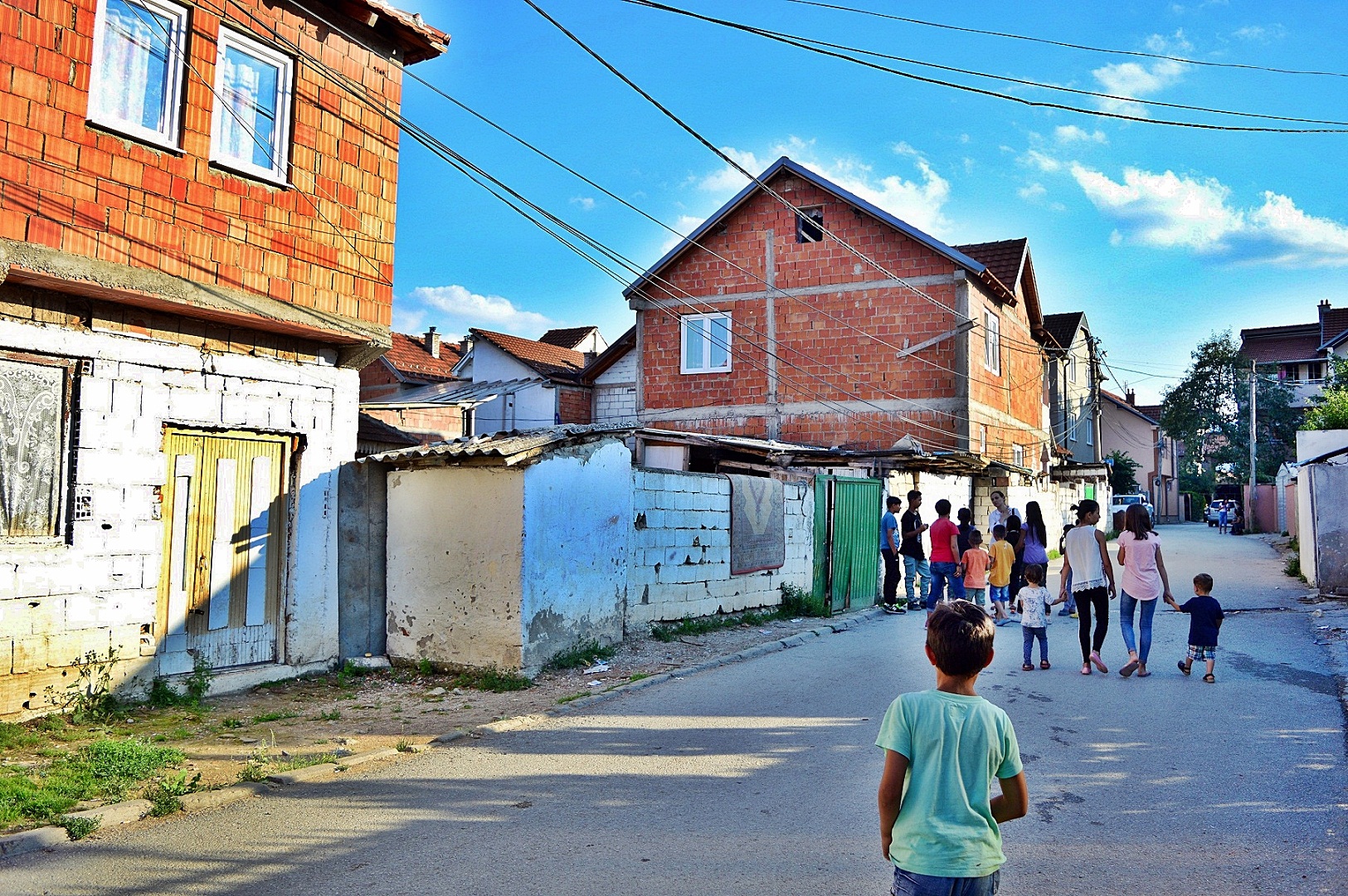
From early morning to late evening they are forced by their parents to chase people in the streets and ask for money. Sometimes they are ordered to sit on the sidewalk without moving for many hours, hoping to arouse the pity of passers-by and take their coins.
NGOs in Albania fighting for the rights of the Roma community believe their childhood and education are sacrificed so their families can have a roof over their head and food on their table.
Away from their homes and without a permit for a long stay in Kosovo, their parents’ priority is to avoid the police and avoid being deported.
But according to authorities and NGOs, for the children being forced to beg there are bigger risks: sickness, accidents, being robbed, beaten up, sexually exploited and abused, trafficked by criminals and being kidnapped for illegal adoption are only some of the risks that Roma children face on daily basis.
When a child roams in the streets, these risk grow even more.
In Albania, the Roma are the poorest and most marginalized ethnic community, often on the verge of survival, and for years they have exploited their children and forced them to beg on the streets of Kosovo.
Daniel, a seven year-old from Tirana, begs in a parking lot in Prizren. After the drivers park their car, he follows them asking for money. His grandmother Maria, who begs in the streets of Prizren, is horrified that someday he might be hit by a car.
“Only my heart knows how difficult is to ask Daniel to beg, but his mother left and this is the only way I can feed him and his brother,” she said to Prishtina Insight.
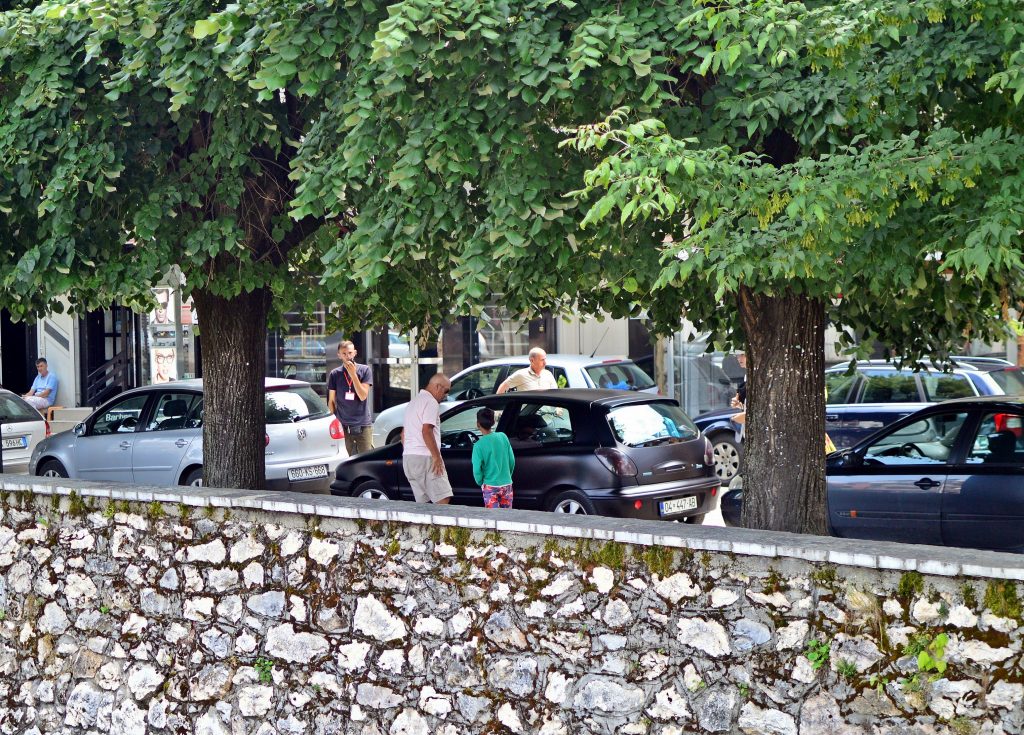
In the first nine months of 2018, Kosovo police have identified 140 citizens of Albania begging in its cities’ streets. It is estimated that at least 85 of them are children.
According to the police, last year 127 Albanian citizens – adults and children combined – were identified as begging in Kosovo streets. In 2016 the number was 172, in 2015 was 162 while in 2014 it peaked to 455.
Altin Hazizaj, director of the Children’s Human Rights Centre of Albania, CRCA, said to Prishtina Insight that they have had many cases reported of Albanian Roma children who have begged in Greece and Italy suffering from sexual abuse or being used for pornography and prostitution involving pedophile rings.
“From Kosovo, we haven’t got such reports, but no one should be surprised if a few years later such stories are going to be reported to us or other institutions,” he said.
Kosovo Police echo the concern. Police officer Salih Dragidella said Kosovo’s city streets can easily turn dangerous for children brought in to beg.
“The risk is high especially for girls. They are at a serious threat of trafficking,” he warned.
According to the Kosovo Police figures, during 2016 and 2017 they identified 23 cases where children were exploited for prostitution, five for forced labor and services and three who were held in slavery.
Kosovo’s main city courts such as Prishtina, Prizren, Ferizaj and Gjilan had difficulty showing that they had dealt with cases where victims have been children from Albania.
The only case that the Ferizaj court could provide was of July 2016, where an abuser of a 13 year-old child was a woman compatriot with the initials E.A.
“The child has been exploited and forced to do hard work, more exactly to beg, every day from the morning to the late evening from this woman that was not her mother and the money collected during this activity was kept by her,” the ruling read.
It ended with the judge’s decision not to proceed with the conviction of the woman, but deported her to Albania and banned from entering Kosovo again for the next two years.
Deportation like this is how Kosovo Police and the judicial system has handled the situation with Albanian Roma people for many years.
During the first six months of 2018, they deported 56 people across the Albanian border – children and adults.
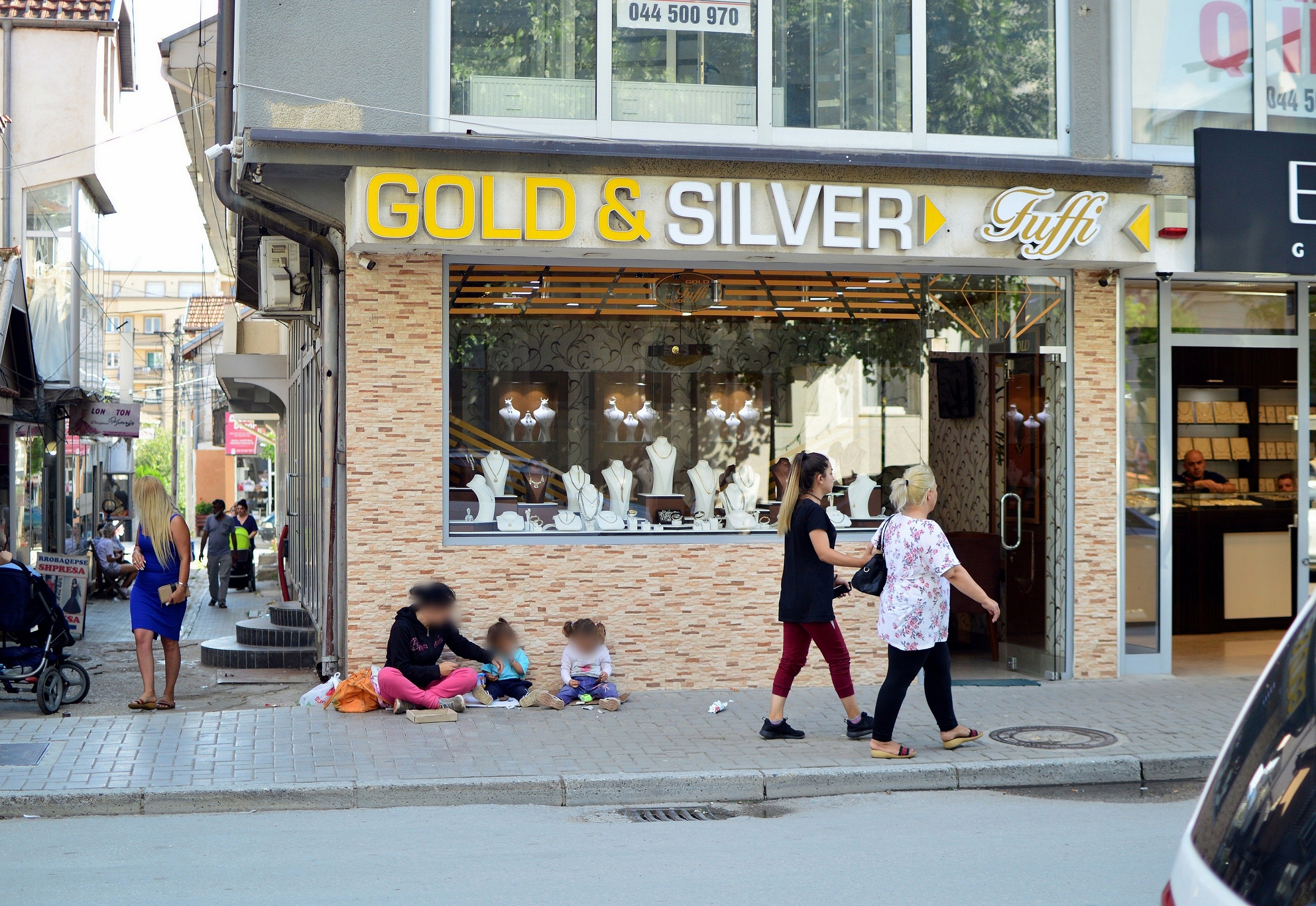
Tension over the “uninvited” citizens of Albania is evident in Kosovo, and their neighbours in Ferizaj are particularly not happy.
“They are not concerned about the joint space. Since they came this neighbourhood is dirtier than before,” one said without wanting to be identified.
In Prizren, where beggars from Albania ask for money in the bars alongside the Lumbardhi river banks, people are angry.
“They have made our life difficult. Generally, there are 30-40 women or children every day that come to my bar and ask for money. They don’t leave if the client refuses to give. I have to intervene and give them 50 cents just to leave,” Valmir Kryeziu, an owner of a bar in Prizren explained to Prishtina Insight.
Over the border, Albania doesn’t seem particularly happy to take back the children and their parents.
A Kosovo police officer – who didn’t want to be identified – said in 2015 they had a crisis at the border, with Albanian police refusing to register a bus of deportees as returnees.
“They had the issue of getting a lot of repatriations from European countries, getting also beggars from Kosovo will further increase the overall number and this will not look good,” he said.
But here is where smugglers enter the game.
The parents of the children begging in Kosovo’s streets say they have paid 200 to 300 euros to smugglers to help them get into Kosovo via trails that avoid the border crossing.
“This path is not dangerous or tiresome at all. The only problem is the money so we avoid as much as we can to get caught by the Police,” said Kela, a 17 year-old from Durres that begs in Ferizaj streets together with her toddler sister.
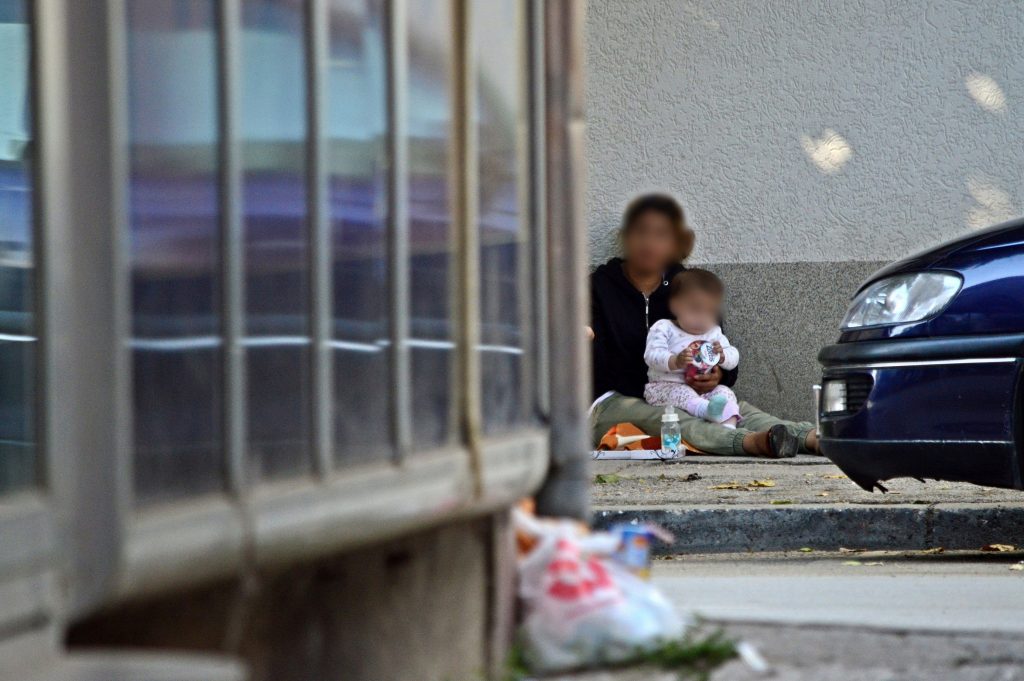
Off the record, Kosovo Police describe how smugglers from Albania help beggars to return to Kosovo very easily.
“In 2016 we deported tens of them back through the border checkpoint. It will be the case that they will be able to return through help by the smugglers faster than us in the city streets again,” a police officer said.
Albanian police in Kukes are well aware of Roma Albanians passing illegally into Kosovo, but they denied that they are helped by others for an exchange of money, even though other people confirmed this.
The director of Border and Migration for Albanian police in the region of Kukes, Ferdinand Gjeta, said that they have never caught any smuggler transporting Roma illegally across the border.
“We have cases where Roma are detected illegally passing the border. They have been stopped, interviewed and turned back. They don’t need a guide since now they know the area well,” he said to Prishtina Insight.
Marenglen Hadaj, police commander of police at the Morine Albania border crossing, said that Kosovo’s police share responsibility for the illegal crossings.
“They pass illegally to Kosovo, so, in this case, it is their police’s problem, not ours,” he said.
The lack of political will from Albania and Kosovo on this issue is seen as one of the most important obstacles towards finding an end to this problem, according to Alketa Lasku, the Deputy Country Representative at Terre des Hommes Foundation in Albania and Kosovo.
“In Kosovo, the perception is that this is Albania’s problem, while in Albania authorities believe that services to those people should be provided in Kosovo,” she said.
The foundation has been working on the issue of children exploited for begging outside the borders since 2009.
Albanian authorities have been very slow in responding to the risk that children face in Kosovo, representatives of NGOs on children rights conclude.
A group of representatives from the state Agency for the Rights and Protection of the Child, the National Anti-Trafficking Coordinator and non-governmental organizations, helped by child protection units in the municipalities, have together started slowly to assist in the first repatriation cases.
According to the Albanian Children Agency, in 2018 they took care of four cases of trafficked children referred to them by the Anti-Trafficking Coordinator, and identified by the Kosovo authorities.
“The cases were referred to us by the Coordinator, three of them in Fier and one case in Shkoder. We have further referred them to municipalities child protection units to identify and assess the situation which their families are in,” said the agency.
In 2017, there were three cases of children’s’ assisted repatriation.
However, Rovena Voda, the national Anti-Trafficking Coordinator and Vice-Minister of Interior, said that the issue of Albanian children begging in Kosovo is a sensitive one, since they are mainly exploited by their parents.
“This phenomenon cannot end or just be tackled by the police. It needs a social approach, as well as many actors and factors,” she said.
The weak job of institutions in stopping children trafficking was also reflected in the June 2018 “Trafficking in Persons” report of the US Department of State.
“Identification efforts for forced begging remained inadequate, particularly among unaccompanied children, street children, and children moving across the borders for begging,” it reads.
The Europol situation report on Criminal Networks Involved in the Trafficking and Exploitation of Underage Victims in the European Union released in October 2018 was again a hard blow for the institutions.
“Europol has received information regarding several criminal groups composed of Albanian-speaking suspects trafficking minors into the EU, both boys and girls, for their labour and sexual exploitation, and also for illegal adoption,” it reads.
Altin Hazizaj of the Children’s Human Rights Centre of Albania said that to this day, its institutions do not know how many children left Albania to Kosovo, how many of them returned or what happened to those that didn’t.
Kosovo is a favorite land for Roma families for begging for several reasons.
It is within easy reach, it shares a common language and the Euro currency is more valuable than the Albanian Lek. These are are only the first of many reasons they seek to cross the border.
Kosovo may be a foreign country, but that actually makes the stigma of begging on its streets easier to bear.
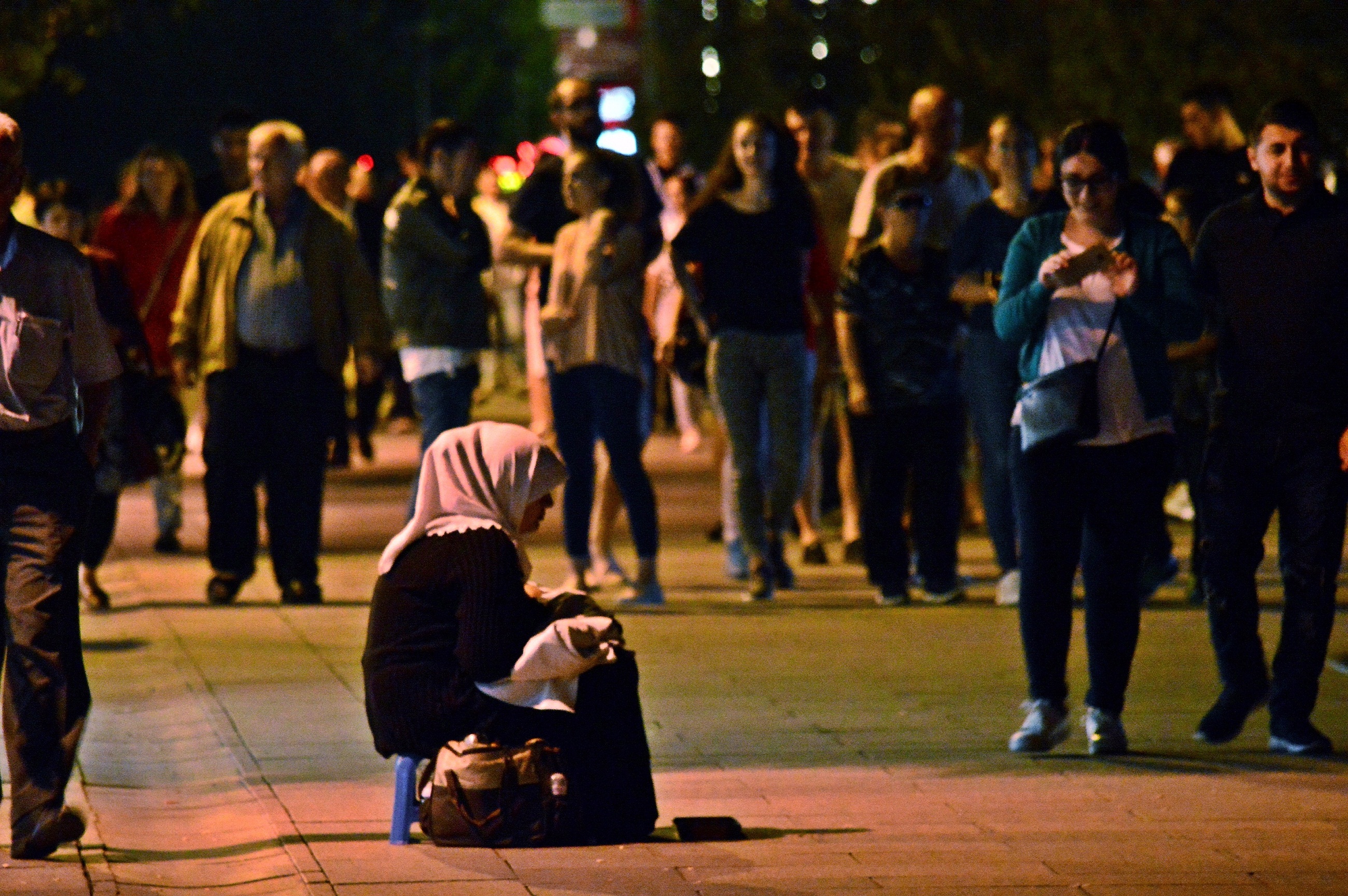
“In my hometown Fier, I would never have the courage to beg in the streets, I would be so ashamed. Here is easy,” said Kimete, a 27 year-old carrying a toddler in her arms while begging in Pristina.
The generosity of people in Kosovo is also a reason families move there to beg.
Shpresa, a 25 year-old Roma woman from Tirana, spent the last three summers begging in Ferizaj together with her three kids aged seven, four and two. The three of them beg separately in order to gain as much money for the family as they can.
“In Tirana, people refuse to give us money and are very aggressive. They offend and even push us. Here people very rarely behave in this way,” she said.
Another factor adding to Kosovo’s attraction is that in Albania, legislation and institutions have harshened their attitude toward parents who force their children to beg in the streets.
Cases have been taken to court under the “Maltreatment of Minors” article of the Criminal Code that envisions a two to five year prison sentence for cases when the child is forced to beg.
In a court case from May 4, 2017, based on this article, a father of six was sentenced to one year and four months of prison time after it was found that his two children had taken to the streets to beg. In the ruling, the judge argued that his sentence was eased by the fact that the father was part of the Roma community with no other means to survive.
When a mother is subject of ruling in cases like this, the judges have tended not to apply prison sentences. In a court case from February 2017, a mother of six was found guilty for forcing her children to beg. But in the ruling, a three year prison sentence was suspended based on the sensibility that the woman was divorced, with no job and in a very difficult financial situation.
However, in June 2017 a new law on child protection entered into force, giving municipality workers the space to take parents who force their children to beg to the police and the prosecutor’s office.
Tirana Municipality’s Unit for Child Protection confirmed that up to this time, they have taken to the police 12 parents and the police have further referred 11 of them to prosecutors.
While the vigilance for children forced to beg in Albania has increased, little effort is put for those taken outside the borders, with their fate lying in the hands of passers-by.
Begging with her three children during the summer months in Ferizaj secures enough money for Shpresa’s family to survive for the rest of the year in Elbasan.

However, the fact that her children are losing their childhood and the right to have an education on the Kosovo streets is something that haunts her every day.
“In Albania, nobody ever has asked me if I need help to raise my children and I don’t know any other way how to do so. But I still dream that one day they will be able to attend school,” she said.
Feature photo: A child sleeping nearby the river bridge in Prizren. | Photo: Antonio Çakshiri.
13 November 2018 - 10:35

Displaced Roma once housed in camps near the Trepca mine continue to s...

Kosovo’s Rolling Film Festival takes the lead in bringing Roma contr...

After leaked wiretaps showed governing party MPs using racist slurs, K...

The UN expresses regret for north Kosovo’s Roma communities who suff...
Lorem ipsum dolor sit amet, consectetur adipisicing elit. Optio, possimus obcaecati repellendus minus ut voluptatum laboriosam, neque fuga velit! Asperiores sint facere accusamus. Enim, omnis vero magnam beatae tenetur, et, architecto aliquid neque facilis itaque doloremque maxime sit. Alias sapiente ab odio corrupti reprehenderit beatae eius quis tempora, perspiciatis obcaecati culpa debitis molestias, officiis, nulla iste delectus tenetur sunt dolorem ea perferendis laboriosam, praesentium voluptatibus velit atque sint. Eligendi deserunt fugiat molestiae ex, animi, libero asperiores quis perferendis vero quibusdam, inventore dicta optio minus fuga reprehenderit officia quas dolorum error amet aliquid. Aut, non mollitia, corrupti nesciunt fuga vel hic.